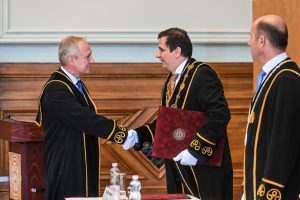Civil service requires curiosity, multifaceted knowledge and patience, but humour is often useful too, says Gergely Prőhle, Director of the Institute for Strategic Studies at the University of Public Service and Programme Director of the Europe of Nations Career Programme, a joint programme of the Ministry of Justice and the Ludovika University of Public Service. In our portrait of him, we find out how he came to this conclusion during his eventful life.
Gergely Prőhle was approached by Rector András Koltay after his departure from the post of Director General of the Petőfi Literary Museum, saying that part of his programme was to build an institutional network at the university, and that he would have some tasks to do in this. Their acquaintance dates back to the days when they worked together to calm the international backlash over the media law. At the first meeting, Gergely Prőhle made it clear that although he is very comfortable in the academic world, throughout his life, his academic career has always been sacrificed to practical tasks, despite his numerous publications. However, they also agreed with the Rector that the University of Public Service will benefit from the fact that, in his work as a public and government official, he always sought to ensure that public administration is not just a task of everyday administration, but also has a certain perspective, and thus a link to the academic world. As he puts it: “Even at the lowest level of public administration, everyone should be aware that they are part of a larger system, not just making chair-legs in the phalanstery.”
He is convinced that any public servant, whether ambassador, ministerial or municipal administrator, who contacts the outside world, must find in their work the creativity and flexibility that, alongside the loyalty and discipline required for the task and the political circumstances, can grant public service a higher dimension. It is also essential not to lose one’s cultural compass and to maintain curiosity about the unknown. After all, part of the state’s task is to receive and evaluate information from outside, even if it is contrary to the expectations of the relevant system. As he puts it: “We must always try to think together with those whom God has placed in the world at the same time.”
What is a public servant like?
According to Gergely Prőhle, quality public service requires curiosity, a broad outlook, a sense of responsibility and patience, but a sense of humour is also useful. The Europe of Nations Career Programme aims to prepare young people for jobs in the European institutions. At the programme’s admission event, when he met more than 150 applicants, they tried to select students accordingly. Interest and curiosity are key: not just in individual matters, but also in other people. Diplomacy and national advocacy is a series of interactions and encounters on the international stage, when you have to achieve your goals in a variety of situations and with a variety of actors. So public sector workers need to be made aware that they are not just part of a machine, but that they are dealing with issues that have a far-reaching impact. This also requires, of course, that public administrations allow for career planning – making it clear that they do not just need servile workers.

What does a public servant know?
During his career, Gergely Prőhle several times found himself in situations where he was in charge of solving completely unexpected tasks that were far from his original qualifications. He says that when managing an institution, or even a minor organisational unit, having the right perspective and network of contacts in a particular field or in academia can be far more important than presenting spectacular excellence in a single field. Such a generalist approach is not without dangers, of course, and it requires a great deal of humility towards the expertise of others. It is worth recalling, of course, the proverb: “God gives you a role to play, God gives you a reason to play it” – there are exceptions, of course…
External service experience
Gergely Prőhle was sent as ambassador to Berlin by the first Orbán government, after having spent two years as State Secretary for Public Administration at the Ministry of National Cultural Heritage, but the Medgyessy-Gyurcsány government also kept him as ambassador until 2005, albeit in the less politically exposed Berne. His daily contact with German politics has convinced him that the key to many, if not most, doors in Brussels lies in Berlin. In his view, a striking symbol of the depth of German-Hungarian cooperation, among many other historical, political and cultural components, is the fact that, in the already enormous trade in goods, the Hungarian state buys German tanks and the German defence industry establishes production units in Hungary. At Ludovika, it probably doesn’t need to be explained at length that this implies a great deal of trust on both sides.
As ambassador to Switzerland, he experienced a down-to-earth sense of patriotism, which also manifests itself in economic patriotism. In Berne, he saw that Swiss eggs, twice as expensive, were selling out in grocery stores much faster than much cheaper imports from the EU, including Hungary. It was not difficult for him to understand what patriotism really means; not the sentimental one, but the love of a country with both feet on the ground, even at the cost of material sacrifices. Switzerland was also a great learning experience for him, because he got to know one of the oldest democracies in Europe, where linguistic and cultural diversity is reflected in a successful model of integration that has proved its sustainability for centuries. Gergely Prőhle, Head of the Institute for Strategic Studies at the NKE, seeks to make use of these experiences. The activities of the Institute so far clearly show its ambitions for Hungary, and in particular the Ludovician traditions, in an international, primarily European context. The Visegrád Cooperation and the European Union are important organisational frameworks for this space, which must be redefined in the light of the circumstances and our sovereignty aspirations.
Public service and faith
Gergely Prőhle comes from a Lutheran family, which is also a defining fact for him. He himself is now in his third six-year term as General Superintendent, or secular leader, of the Hungarian Evangelical Church. It is an elected, social mandate in the leadership of the Church, the main task of which is to ensure the closest possible relationship between the Church and the secular sphere. This service is fulfilled not only by his own faith, but also by his commitment to his evangelical pastor ancestors.
He feels that the question of how faith can influence the work of leadership and governance has very many layers. He cites Luther’s The Freedom of the Christian Man, which says that man, because he is in direct connection with God, according to his faith, is not a servant to anyone in this earthly world, but at the same time is a servant to all. This approach places the believer in a position in the earthly hierarchy that makes autonomous movement natural.
This is not, of course, a kind of overconfidence, nor a complete disregard for hierarchy. Rather, it is a vision that says there is a point of view beyond what my superiors think about the world. The point is to be clear about one’s purpose and obligations in the spirit of Christian freedom, as described by Luther.
Childhood in Buda
Now, when his children are about to make a career choice, Gergely Prőhle has a hard time learning from his own choices and what he can tell them about it. He is very grateful to his parents for the many opportunities they gave him. When he was a child, he and his family travelled a lot, camping all over Europe, in the socialist countries, but less often in Western Europe. These experiences made him aware of the richness of European culture.
And the family’s musical background was added to this. His father was a flautist, a member of the Opera House, head of the wind department at the Academy of Music, and his mother was a cello teacher. He himself has been playing the piano since the age of six. Coming from a family with a very strong German language tradition due to his ancestors, he still chose to study French at grammar school. Triggering some family resistance, he then switched to the light genre, and in 1983, the year he graduated from high school, he won the jazz category of the Who Knows What with the Stúdium Dixieland Band. To this day, he still takes great pleasure not only in listening to music, but also in actively making music, reading, and travelling, whenever he can. He uses carpentry as a form of relaxation, which he started as a child with his father.
And yet not a musician
Why did he not become a professional musician? After finishing his university studies, as a young university lecturer, there came a moment when two opportunities knocked on the door at the same time. On the one hand, he was invited by the Friedrich Naumann Stiftung to head the Budapest office of the liberal German party foundation. On the other hand, the Budapest Ragtime Band changed pianists at the same time, and the new musician was due to sign on for a six-month Mediterranean cruise. It was not primarily out of rationality, but for matters of the heart that he decided to stay in Budapest. Nowadays, it’s thought that if you aren’t a genius pianist like Zoltán Kocsis then you’re better off as an amateur. However, he is still surrounded by many professional musicians, including his sister, who plays in the first violin section of the National Philharmonic Orchestra.
Returning to the German Party Foundation, at the end of his university years, on the eve of the regime change, he was awarded a German Academic Exchange Service (DAAD) scholarship, after many attempts. Through a friend, he came into contact with German political life through various translation and interpreting tasks, mainly with the representatives of the FDP, the German Liberals. He was particularly influenced by Otto Graf Lambsdorff, former Minister for Economic Affairs, from whom he learned a lot about the relationship between politics and economics and the importance of knowing history. As a 26-year-old young bachelor of arts, the Foundation proved to be a very interesting challenge – he was in charge of publishing books, organising conferences and supporting various university programmes.
The German Liberal Foundation was associated with two Hungarian parties, Fidesz and SZDSZ. As time went on, the two Hungarian parties parted ways, with SZDSZ becoming a government party and Fidesz going to opposition. Until the change of government in 1998, he had to find an appropriate way of running the foundation under these circumstances, which brought a number of political lessons. Working with German public money, he says, was a dressage: it was here that he learned the European methodology of administration, of dealing with problems, the order of accounting, reporting and financial performance – while avoiding excessive red tape.
Gergely Prőhle is glad that after more than two decades of active work in public administration, he can put his experience to good use and seeks to convince the younger generation that it is worthwhile to see opportunities in public service.
Névjegy
Gergely Prőhle
Place and date of birth: Budapest, 26 June 1965.
Qualifications: ELTE BTK, German-Hungarian specialisation
Field of expertise: diplomacy
Publications: Gergely Pröhle’s profile in the Hungarian Archives of Scientific Works
Marital status: married, father of 4 children



